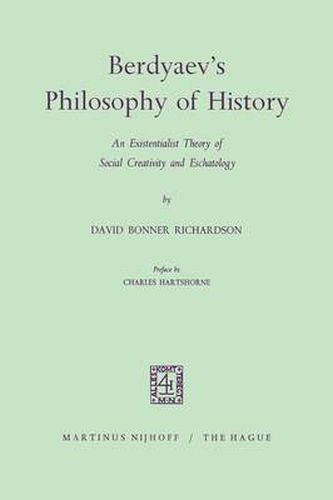Readings Newsletter
Become a Readings Member to make your shopping experience even easier.
Sign in or sign up for free!
You’re not far away from qualifying for FREE standard shipping within Australia
You’ve qualified for FREE standard shipping within Australia
The cart is loading…






This title is printed to order. This book may have been self-published. If so, we cannot guarantee the quality of the content. In the main most books will have gone through the editing process however some may not. We therefore suggest that you be aware of this before ordering this book. If in doubt check either the author or publisher’s details as we are unable to accept any returns unless they are faulty. Please contact us if you have any questions.
BERDYAEV AS A PHILOSOPHER How shall a non-Russian, above all a North American, assimilate the extraordinary assemblage of ideas which is Berdyaev’s philosophy? Dr. Richardson does not exaggerate the difficulties. And he introduces us with great care (and what a formidable task it must have been) precisely to what is most strange in this writer, his fusion of historical .. eschatological-metaphysical-mystical-Christian conceptions. By some standards Berdyaev is a theologian rather than a philosopher; for he takes the truth of the Christian revelation for granted and his work can readily be viewed as an elaborate apologetic for one religion against all others and against irreligion. Yet I incline to sympathize with him in his claim to be a philosopher. What an eccentric one, however! There are indeed some partial analogies in the general European tradition. Certainly this Russian is a disciple of Kant, and strong traces of Kantianism survive in him. He also moved away from Kant somewhat as did Fichte, Hegel, and, above all, Schelling in his last period. His sympathetic response to Heracleitos and Boehme recalls Hegel. The interest in Boehme and Schelling is found also in Tillich. Like the late German-American, Berdyaev rejects conceptual in favor of symbolic speech about God. Like Bergson, he stresses intuition and makes a radical distinction between scientific logical analytic thought and the mode of apprehension by which, he believes, metaphysical truth is to be appropriated. Here one thinks also of Heidegger.
$9.00 standard shipping within Australia
FREE standard shipping within Australia for orders over $100.00
Express & International shipping calculated at checkout
This title is printed to order. This book may have been self-published. If so, we cannot guarantee the quality of the content. In the main most books will have gone through the editing process however some may not. We therefore suggest that you be aware of this before ordering this book. If in doubt check either the author or publisher’s details as we are unable to accept any returns unless they are faulty. Please contact us if you have any questions.
BERDYAEV AS A PHILOSOPHER How shall a non-Russian, above all a North American, assimilate the extraordinary assemblage of ideas which is Berdyaev’s philosophy? Dr. Richardson does not exaggerate the difficulties. And he introduces us with great care (and what a formidable task it must have been) precisely to what is most strange in this writer, his fusion of historical .. eschatological-metaphysical-mystical-Christian conceptions. By some standards Berdyaev is a theologian rather than a philosopher; for he takes the truth of the Christian revelation for granted and his work can readily be viewed as an elaborate apologetic for one religion against all others and against irreligion. Yet I incline to sympathize with him in his claim to be a philosopher. What an eccentric one, however! There are indeed some partial analogies in the general European tradition. Certainly this Russian is a disciple of Kant, and strong traces of Kantianism survive in him. He also moved away from Kant somewhat as did Fichte, Hegel, and, above all, Schelling in his last period. His sympathetic response to Heracleitos and Boehme recalls Hegel. The interest in Boehme and Schelling is found also in Tillich. Like the late German-American, Berdyaev rejects conceptual in favor of symbolic speech about God. Like Bergson, he stresses intuition and makes a radical distinction between scientific logical analytic thought and the mode of apprehension by which, he believes, metaphysical truth is to be appropriated. Here one thinks also of Heidegger.